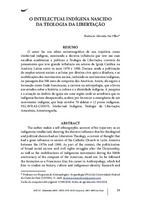O intelectual indígena nascido da Teologia da Libertação
Abstract
O autor faz um relato autoetnográfico de sua trajetória como intelectual indígena, mostrando a decisiva influência que teve nas suas escolhas acadêmicas e políticas a Teologia da Libertação, corrente de pensamento que teve grande influência em setores da Igreja Católica na América Latina entre os anos 1970 e 1990. Destaca ainda a politização de amplos setores sociais e as lutas por direitos civis após a ditadura, e as mobilizações dos movimentos sociais, incluindo os movimentos indígenas, na passagem dos 500 anos da conquista das Américas. Assim, ele seguiu a formação como frade franciscano, a carreira na antropologia, que o levou aos estudos sobre a história, a cultura e a identidade indígena. A pesquisa e a atuação no âmbito da igreja em uma região onde se acreditava que os indígenas haviam desaparecido, acabou por favorecer a emergência de um movimento indígena, que hoje envolve 70 aldeias e 12 povos indígenas. The author makes a self-ethnographic account of his trajectory as an indigenous intellectual, showing the decisive influence that his theological and political choices had on Liberation Theology, a current of thought that had a great influence in sectors of the Catholic Church in Latin America between the 1970s and 1990. As part of the context, the politicization of broad social sectors and civil rights struggles after the Dictatorship, as well as the mobilizations of indigenous movements during the 500th anniversary of the conquest of the Americas, stand out. So he followed the formation as a Franciscan friar, his career in Anthropology, which led him to studies on history, culture and indigenous identity. Research and action within the Church, in a region where the Indians were believed to have disappeared, eventually favored the emergence of an indigenous movement, which today involves 70 villages and 12 indigenous peoples.
Collections
- Revista Avá [359]
The following license files are associated with this item:




